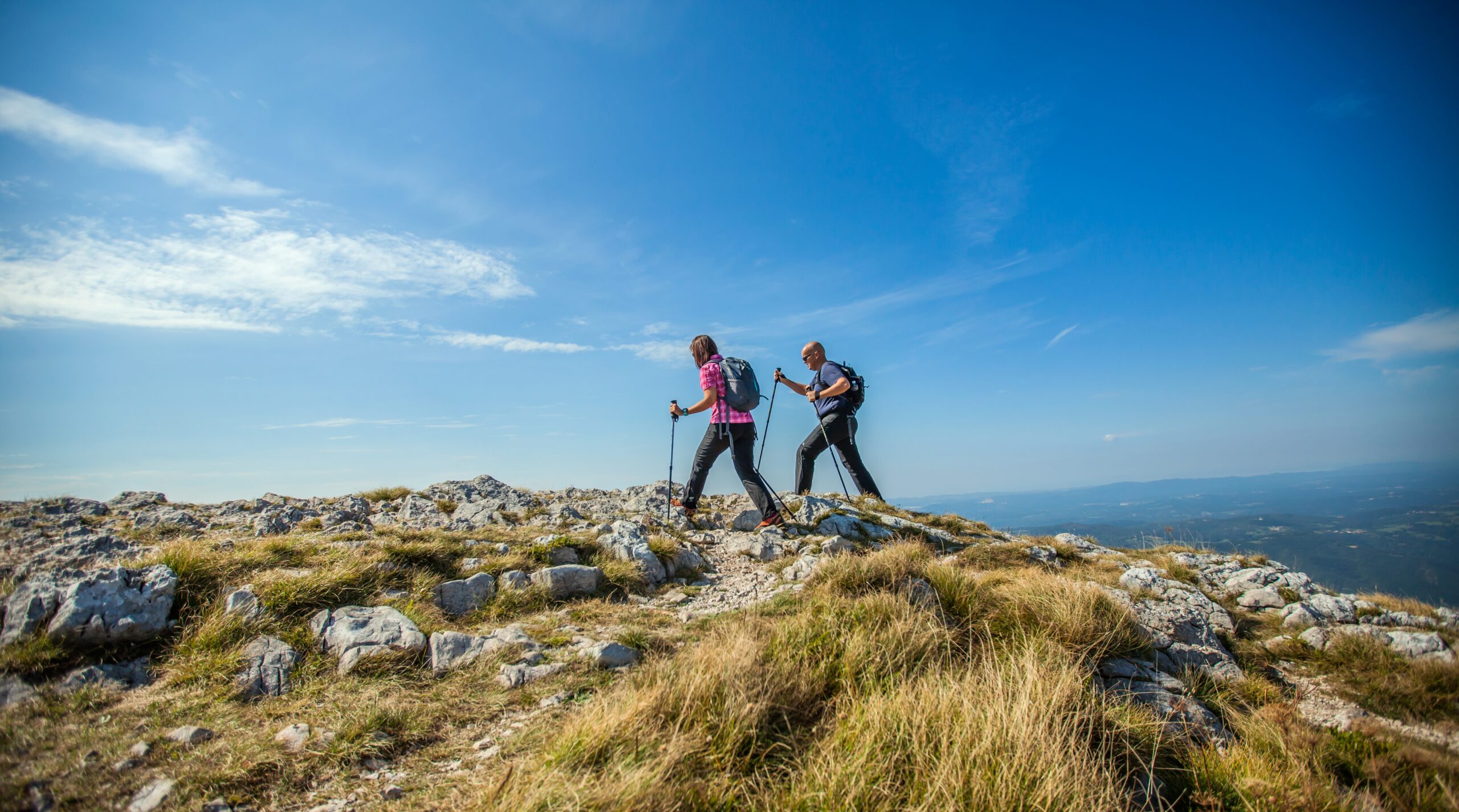Table of Contents
Introduction
In today’s fast-paced world, where stress and anxiety have become common companions, finding effective ways to care for our mental health is essential. Amidst the concrete jungle and technological chaos, nature offers a refuge that can work wonders for our well-being. Hiking, a recreational activity that involves walking on trails and pathways through natural landscapes, is not just a leisure pursuit but also a potent remedy for the mind and soul. In this blog post, we will delve into the various reasons why hiking is beneficial for our mental health, exploring the profound connections between nature, the human brain, and our emotional well-being.
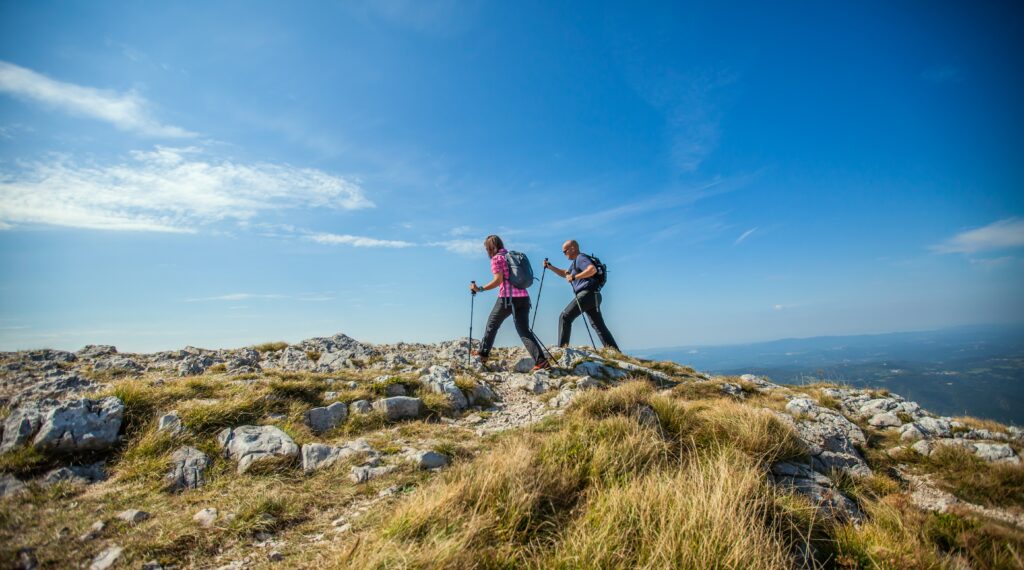
The Healing Power of Nature
- Connecting with Nature: A Therapeutic Escape
In the hustle and bustle of daily life, finding time to connect with nature is often overlooked. Hiking provides an opportunity to break free from the concrete confines and immerse ourselves in the tranquility of natural surroundings. The sights, sounds, and smells of nature have a calming effect on our minds, evoking a sense of wonder and peace. The therapeutic escape offered by hiking allows us to disconnect from the stressors of everyday life, helping us regain mental clarity and balance.
- Reducing Stress and Anxiety
Studies have shown that spending time in nature, such as during a hiking excursion, can significantly reduce stress and anxiety levels. The soothing ambiance of the outdoors triggers a relaxation response in our bodies, leading to a decrease in the production of stress hormones. As we walk amidst the trees and breathe in the fresh air, our nervous system calms down, and the worries that once burdened our minds start to dissipate. Hiking acts as a natural stress-reliever, providing a much-needed respite from the demands of our daily routines.
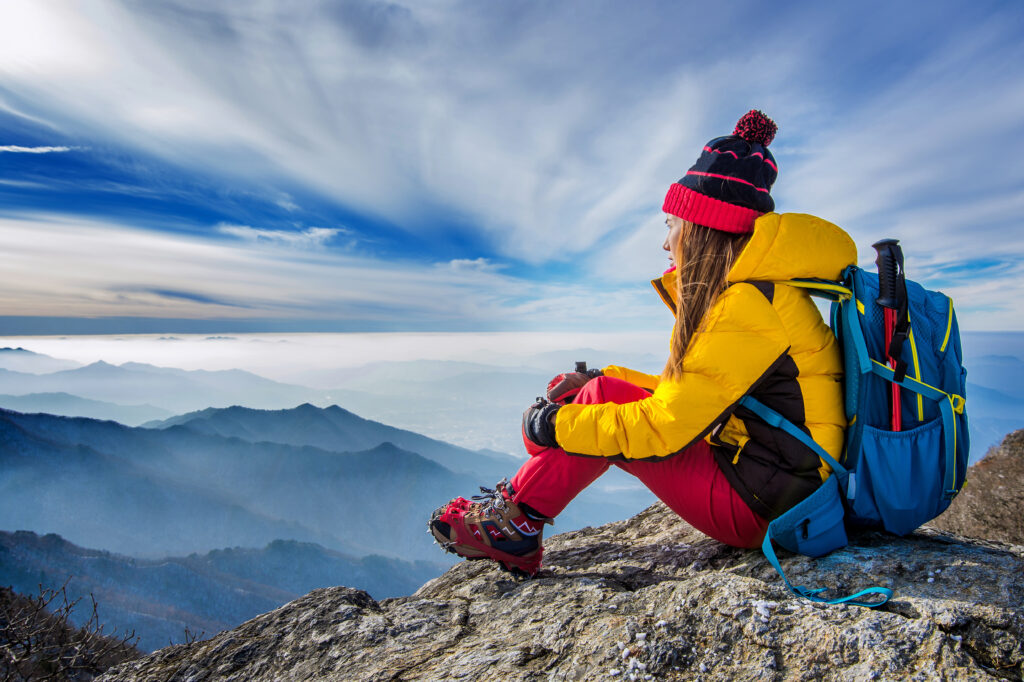
Hiking: A Journey to Inner Peace
- Mindfulness in Motion
Hiking is an excellent way to practice mindfulness, which involves being fully present in the moment. As we trek through the wilderness, we naturally become attuned to our surroundings. The rhythmic sound of our footsteps, the rustling of leaves, and the chirping of birds create a symphony that demands our complete attention. Engaging in this sensory experience brings us into the present moment, freeing our minds from ruminating about the past or worrying about the future. The act of hiking becomes a form of meditation in motion, promoting mental clarity and focus.
- Finding Solitude and Perspective
In the solitude of nature, we have the opportunity to gain perspective on our lives. The vastness of the landscape reminds us of the bigger picture, putting our worries into context. Hiking offers moments of reflection and introspection, allowing us to ponder our goals, dreams, and aspirations. With the noise of the world left behind, we can hear the whispers of our inner selves, discovering insights and solutions that may have eluded us amidst the chaos of everyday life.
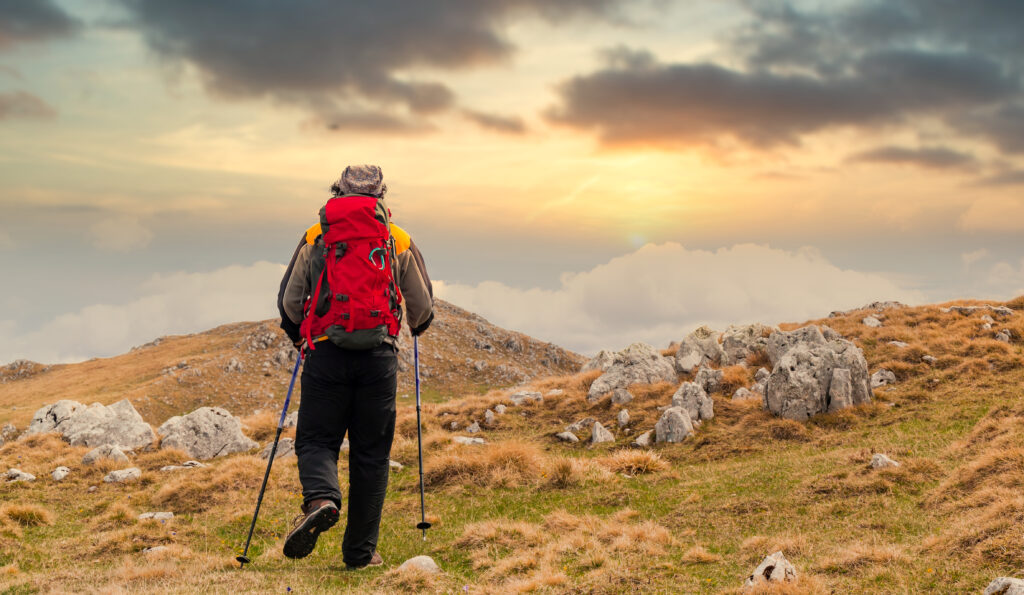
The Neurological Marvels of Hiking
- Endorphins and the Runner’s High
Engaging in physical activity, its releases endorphins in the brain – the feel-good chemicals responsible for the “runner’s high.” These endorphins not only act as natural painkillers but also elevate our mood and create a sense of euphoria. Hiking uphill, navigating challenging terrains, or reaching the summit of a mountain triggers the release of endorphins, leaving us with a sense of accomplishment and joy.
- Nature’s Impact on Brain Function
Research has indicated that spending time in nature can enhance brain function and cognitive abilities. Nature provides a restorative environment that allows our minds to recover from mental fatigue caused by urban stimuli. The greenery and tranquility of natural settings have been linked to improved attention, memory, and creativity. Therefore, not only refreshes our bodies but also rejuvenates our minds, leaving us sharper and more focused.

The Bond Between Hiking and Positive Mood
- Serotonin and its Role in Happiness
Serotonin, often referred to as the “happiness hormone,” plays a crucial role in regulating our mood and emotions. Spending time in nature has been found to boost serotonin levels in the brain, contributing to feelings of joy and contentment. Its provides an ideal setting to stimulate serotonin production, as the combination of physical activity and the beauty of nature creates a recipe for happiness.
- Cultivating a Positive Mindset
As we hike, the challenges we face on the trail teach us valuable life lessons. Conquering steep slopes, navigating rough terrain, and pushing through fatigue instill a sense of resilience and determination within us. These experiences on the hiking trail translate into our daily lives, enabling us to approach challenges with a more positive and proactive mindset. Hiking fosters a can-do attitude, empowering us to overcome obstacles and embrace life’s journey with optimism.
The Social Aspect of Hiking
- Building Meaningful Connections
While hiking can be a solitary activity, it also offers an excellent opportunity to build meaningful connections with others. Group hikes and hike clubs provide a social setting where like-minded individuals come together to share their love for the outdoors. Engaging in conversations with fellow hikers, exchanging stories, and appreciating the beauty of nature as a group create a sense of camaraderie and belonging.
- Strengthening Relationships
Hiking can also be a fantastic way to strengthen existing relationships. Couples, friends, and families can embark on hike adventures together, fostering a deeper bond through shared experiences. As loved ones conquer challenges and enjoy the beauty of nature side by side, their connections grow stronger, creating lasting memories that will be cherished for years to come.
Hiking as a Form of Exercise
- Physical Health and Mental Health Connection
Regular physical activity is known to have significant benefits for both the body and the mind. Its, being a form of aerobic exercise, improves cardiovascular health, increases lung capacity, and enhances overall fitness. The positive effects of exercise on mental health are well-documented, with physical activity promoting the release of neurotransmitters that boost mood and reduce stress.
- Enhancing Cognitive Abilities
In addition to improving cardiovascular health, It has been linked to enhanced cognitive abilities. The combination of physical exertion, exposure to nature, and the need to navigate trails activates various regions of the brain, stimulating neural connections and promoting mental agility. As we challenge our bodies during a hike, our brains also receive a workout, resulting in improved cognitive function.

Hiking and Self-Reflection
- Gaining Clarity and Purpose
The solitude and serenity of nature create an ideal setting for self-reflection. When we disconnect from the distractions of modern life, we open ourselves up to inner dialogue and contemplation. Its allows us to reevaluate our goals, aspirations, and values, providing clarity on the path we wish to take in life. It becomes a journey not only through the natural world but also into the depths of our own souls.
- Boosting Self-Esteem
The sense of accomplishment that comes with conquering a challenging hiking trail can boost our self-esteem and self-confidence. As we overcome obstacles on the path, we recognize our inner strength and resilience. This newfound confidence extends beyond the trail, positively influencing how we approach other areas of life.
Immersing in the Present Moment
- Escaping the Digital World
In today’s digitally connected world, we are constantly bombarded with notifications, messages, and distractions from electronic devices. Hiking offers a refreshing escape from the digital noise. Unplugging from technology and immersing ourselves in the natural world allows us to reclaim our attention and be fully present in the moment. The digital detox provided by hiking grants us mental space and freedom from the pressures of the virtual realm.
- Embracing Stillness and Silence
In the silence of nature, we find a profound peace that is difficult to achieve amidst the noise of urban living. Hiking provides opportunities to sit in stillness and listen to the symphony of nature. The rustling of leaves, the babbling of brooks, and the chirping of birds become our companions, offering a therapeutic soundtrack that calms our minds and rejuvenates our spirits.
Hiking and Creativity
- Nurturing the Creative Mind
Nature has long been recognized as a muse for artists, writers, and creative thinkers. Hiking stimulates the creative mind by providing an inspiring and ever-changing canvas. The beauty and diversity of the natural world trigger our imagination, igniting ideas and insights that may have lain dormant in the confines of our daily routines.
- Seeking Inspiration from Nature
Hiking allows us to witness the beauty of creation in all its forms. From the grandeur of majestic mountains to the delicate intricacies of wildflowers, nature’s artistry is boundless. As we observe and immerse ourselves in this breathtaking scenery, we draw inspiration from the wonders of the world, infusing our creative endeavors with the magic of nature.
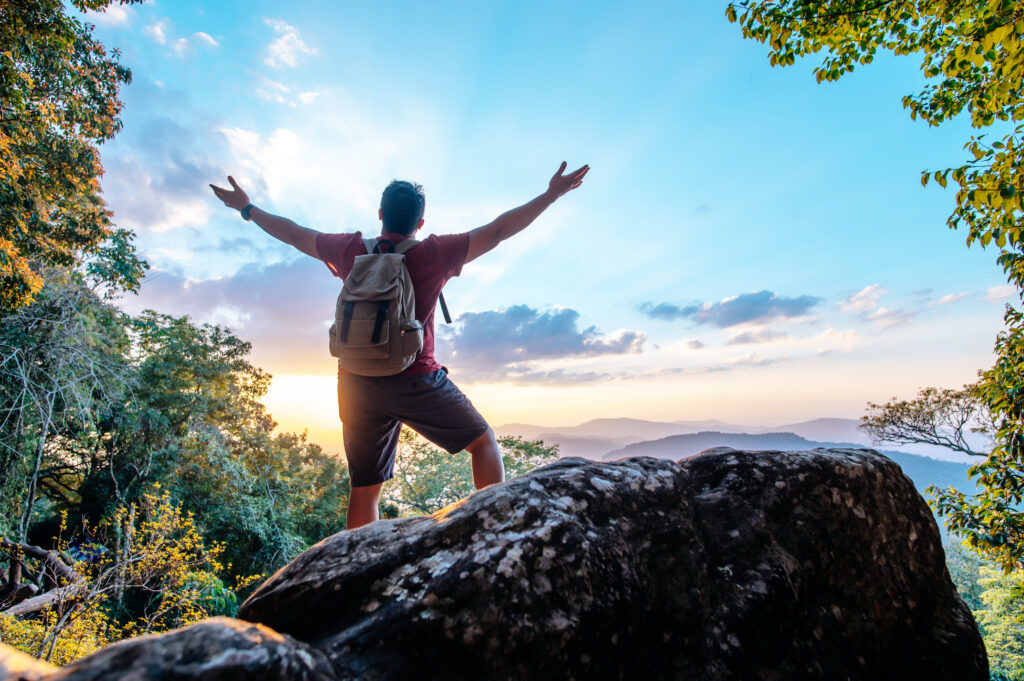
Conclusion
Hiking is not merely an outdoor activity; it is a journey of healing, self-discovery, and growth. Nature’s therapeutic power, combined with the physical and mental benefits of hiking, makes it a balm for our minds and souls. From reducing stress and anxiety to fostering positive emotions and cultivating creativity, hiking has a profound impact on our overall well-being.
In a world that constantly demands our attention and energy, hiking offers a respite where we can reconnect with ourselves and the natural world. So, the next time you feel overwhelmed or in need of a mental reset, put on your hiking shoes, step into nature’s embrace, and let the trails guide you on a transformative adventure.
FAQs:
Q. Is hiking suitable for all age groups?
A. Absolutely! Hike is an activity that brings joy to individuals across all age groups and fitness levels. There are various trails and routes that cater to different abilities, making it an inclusive activity for everyone.
Q. Can hiking help with depression?
A. Yes, It has been shown to have a positive impact on individuals suffering from depression. The combination of physical activity, nature’s beauty, and social interaction can significantly improve mood and overall mental well-being.
Q. What should I pack for a hiking trip?
A. When going on a hike trip, essentials include proper footwear, comfortable clothing, sufficient water, snacks, a first aid kit, and a trail map. It’s essential to be prepared for varying weather conditions.
Q. Are there any risks associated with hiking?
A. While hiking is generally safe, it’s essential to take necessary precautions and be aware of potential risks. Always check the weather forecast, inform someone about your hike plans, and stay on designated trails to avoid getting lost.
Q. How often should I go hiking for maximum benefits?
A. The frequency of it depends on individual preferences and schedules. Even going on a short hike once a week can yield significant mental health benefits. Regularly immersing yourself in nature is the key to reaping the rewards.

